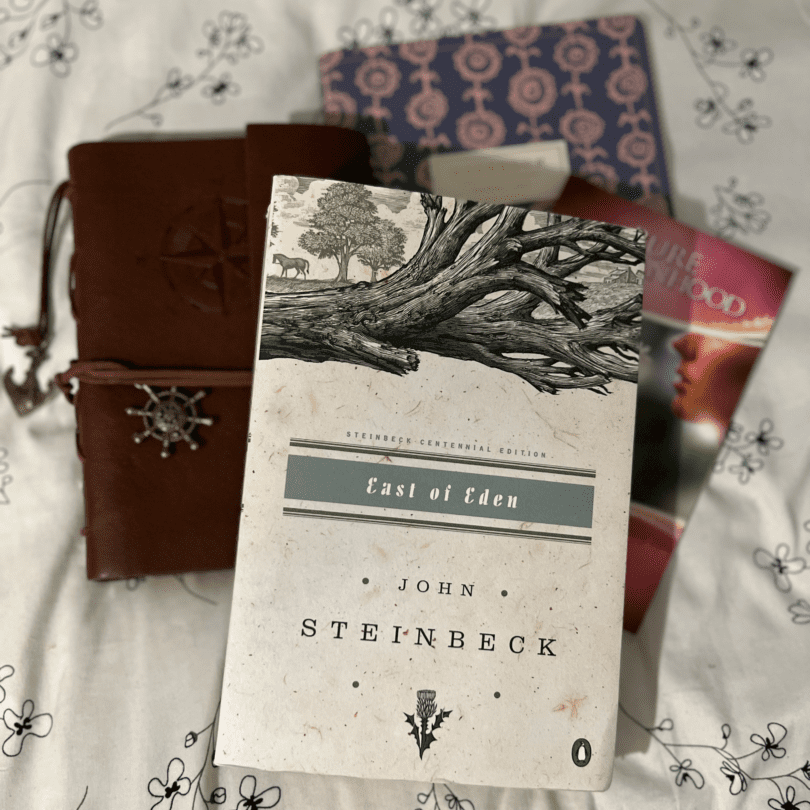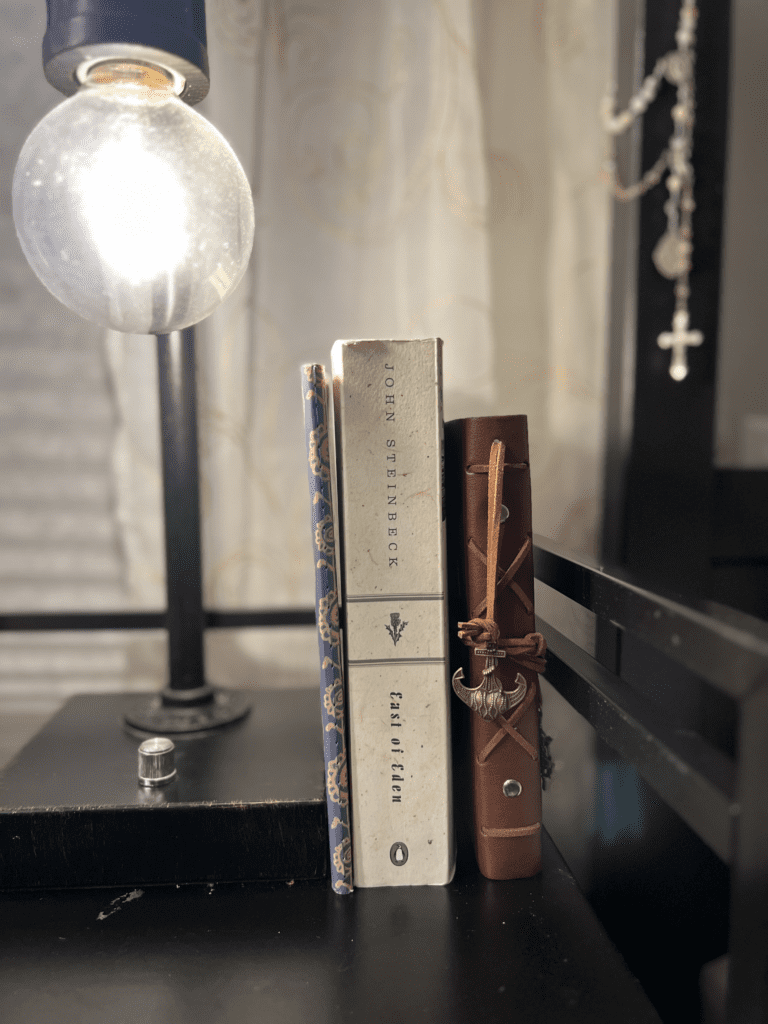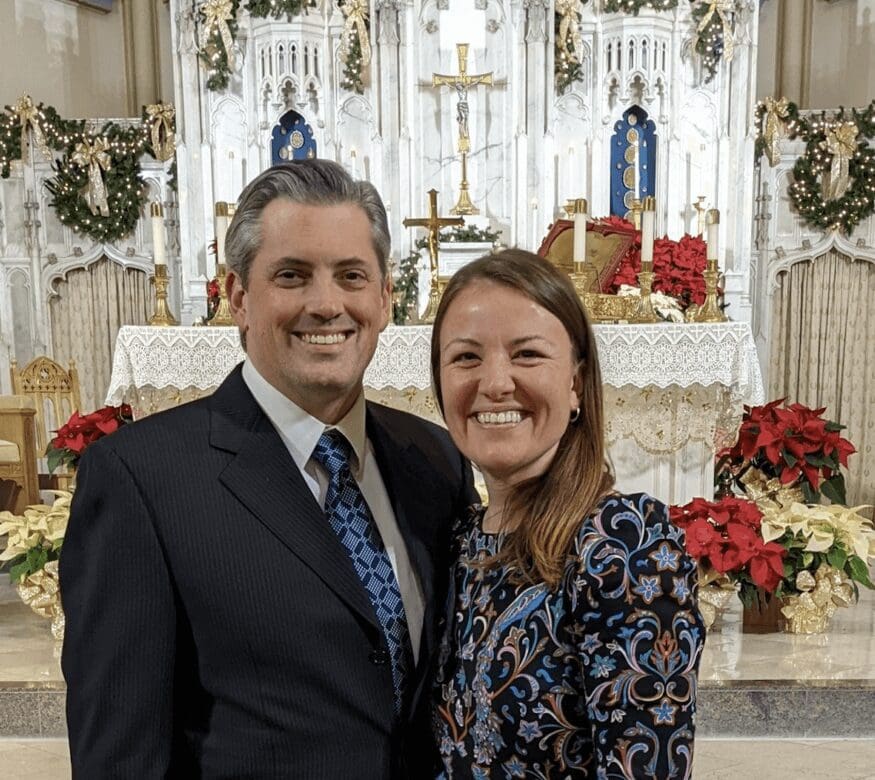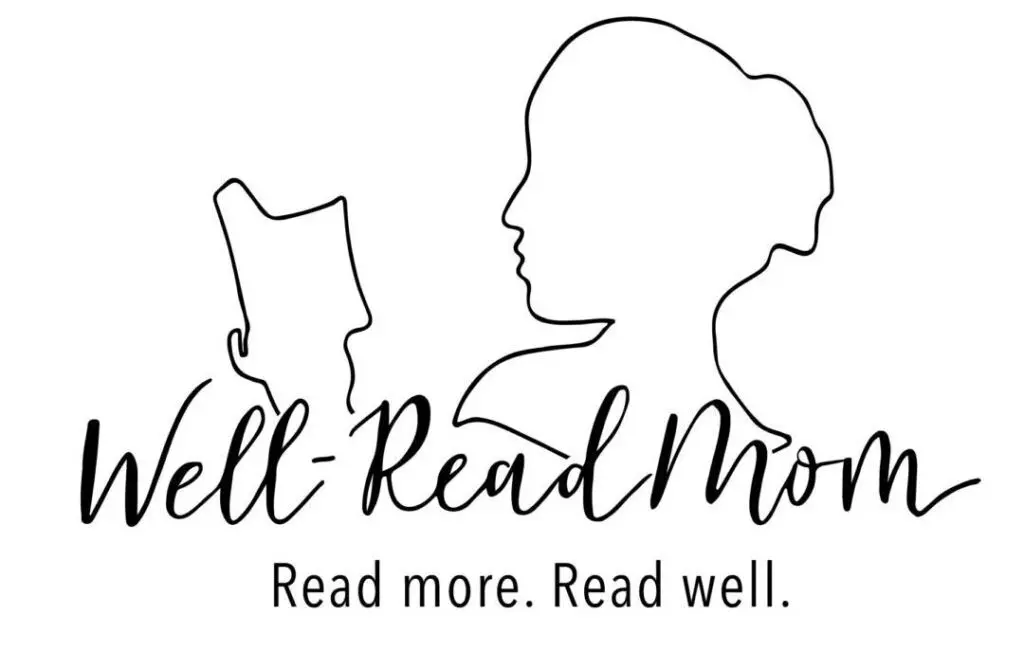The Hard yet Fruitful Components of Literature
By Nicki Johnston
When we read literature, we consider hard questions. What should the character have done? What would I do in his situation? Which character do I want to emulate? From what must I repent?
Over and over again, Well-Read Mom offers us beautifully challenging books that force us to consider these questions. None was so meaningful to me as East of Eden. I could not read the book at arm’s length; instead, I clutched it tightly, captivated. Steinbeck’s masterpiece absorbed me from the first chapter’s gorgeous descriptions of the Salinas Valley. Like the very best of books, it sent me, over and over again, to prayer, my Bible, and the sacraments. And in the most uncomfortable yet incredibly healing way, it held a mirror to me.

Like all readers, I immediately hated Cathy/Kate and loved Samuel Hamilton. Yet despite my wish to deny it, I most identified with Adam Trask. While Adam’s life circumstances were much different from mine, I had experience with hardship.
Nearly one year ago, my family was in a severe car accident. While driving my four boys from the library to a friend’s house in the middle of the afternoon, we were hit head-on by a drunk driver. Praise be to God; we survived this terrible incident.
And yet the wounds of this car crash went so deep for me that I, like Adam after Cathy shot him and ran off, spent much of the past year holding onto my victimhood and feeling sorry for myself. So, when Samuel Hamilton confronts Adam—first with a punch to the face when Adam refuses to name his boys (257) and then again in his reprimand of Adam leaving his land fallow—I was struck to the core.
I had indeed “take[n] pride in [my] hurt.” Being a victim of this car accident made me “seem large and tragic”—at least to myself. Like Adam, I was “playing a part on a great stage with only [my]self as an audience” (293). Reading these words made me see myself and my situation clearly and helped me recognize my lack of freedom due to my pain. I didn’t want to see this. I didn’t want to be Adam. I wanted to be Lee.
Lee, no stranger to tragedy himself, faithfully serves Adam. While raising the boys, keeping the house, and nourishing the family through his cooking (in short, playing the role of the missing wife/mother), Lee looks outside of himself and makes time to cultivate his own intellectual life. Doing so, he says, makes him a man (302). I want to be a woman, serving my family (service being the “refuge of a philosopher… a position of love” according to Lee (163)), listening deeply to those around me and bringing out the best in others, all while letting go of my selfishness—just like Lee does. And as the voice of Timshel in the book, Lee reminds us that we have a choice. We can choose freedom and forgiveness.
I loved so much about this book and am so grateful Well-Read Mom selected it for us. It is a masterpiece of literature (dare I say, the Great American Novel?), and I could have written half a dozen articles about it from a literary perspective. But the real reason we read, our call from Well-Read Mom, is to be changed by our reading. Though full of depravity and ugliness, this book called me to greater virtue.
But the real reason we read, our call from Well-Read Mom, is to be changed by our reading. Though full of depravity and ugliness, this book called me to greater virtue.
Nicki Johnston
So did another dark story that played a surprising role in my healing. In the months following our accident, our family prayed for forgiveness and healing for the man who hit us. But it was very abstract. When I went last month to his sentencing hearing (at the request of the prosecution because our family had advocated for probation instead of incarceration), I got to see the man who hit us for the first time since he was carried away from the accident unconscious on a stretcher. He was no longer a theoretical “enemy” that I was commanded to love and pray for in the abstract. He was a real, flesh-and-blood image-bearer. He was, in the words the grandmother in Flannery O’Connor’s “A Good Man is Hard to Find” uses to describe the misfit: “one of my babies… one of my own children.” Upon seeing him, my heart filled with compassion and love for this young man. I delivered my victim impact statement and then was able to look him in the eyes and assure him of our family’s forgiveness. Through that forgiveness, I experienced freedom. It was one of the most beautiful moments of my life, all a result of something so ugly, which occurred because of the fallenness of our world.
Our world is fallen; we live east of Eden. And yet, as Christians, we know that there is redemption in our suffering. There is hope in tragedy. The darkness cannot overcome the light. This knowledge enables us to bear real-life sufferings and enter even the darkest stories. We need not shy away from reality, including from good books that portray its fallenness.
When our WRM group gathered to discuss the second part of this book, our lovely hostess played a Mumford and Sons song called “Timshel” for us. The lyrics include these repeated words: “And you are not alone in this. As brothers, we will stand, and we’ll hold your hand.” We are not alone. The Giver is always with us. Included in the many ways He presents himself to us are people—both in real life and as characters from books.
Sometimes we need our hand held. A comfortable, happy book may offer us this kind of consolation, but it’s even better when it comes from our community. After our car accident, my WRM group held my hand. They brought meals and groceries, offered me rides to meetings, and lifted our family in prayer. For all of this, I am so grateful.
But sometimes, we need a punch in the face. I, for one, would much rather it come from a book than from real life. This wisdom is one of the many compelling reasons to read hard books. They can help us practice for things we have yet to experience in real life (many of which we pray we never do), awaken us to reality, and invite us to freedom. This power of great literature—especially literature read in community with one another—is offered to us. We must be courageous enough to accept and see the fruit of being a Well-Read Mom.


Nicki Johnston
Nicki Johnston is a home educator, a CGS catechist, an avid reader and an amateur naturalist. She lives in Kansas with her husband, Graham, and their four young sons.
About Well-Read Mom
In Well-Read Mom, women read more and read well. Our hope is to deepen the awareness of meaning hidden in each woman’s daily life, elevate the cultural conversation, and revitalize reading literature from books. If you would like to have us help you select worthy reading material, we invite you to join and read along with us. We are better together! For information on how to start or join a Well-Read Mom group visit our website wellreadmom.com

